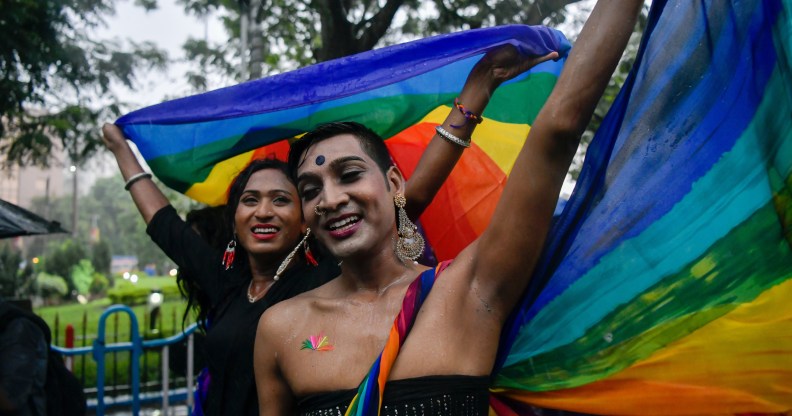India’s bid for marriage equality inches closer as Delhi High Court joins up three separate landmark cases

LGBT+ community members celebrate with a rainbow coloured flag in Kolkata. (Getty)
Three pleas. One goal: Bringing marriage equality to India.
In a three-pronged push to bring marriage equality to the books, one of India’s top courts called for the government Thursday (November 19) to respond.
Justices at the Dehli High Court sent out a notice for the legislative to rejigger existing marriage laws, the Hindu Marriage Act (HMA) and the Special Marriage Act (SMA), to recognise the right.
Justices Rajiv Sahai Endlaw and Asha Menon issued the central government just four weeks to respond to a plea that argues that the bills do not explicitly distinguish between mixed and same-sex marriages – a legal loophole pounced on by LGBT+ activists.
The justices, according to the Hindustan Times, responded to a plea placed by four LGBT+ activists in September, as well as two similar petitions.
Activists use legal loopholes to compel courts and government to finally enshrine India with marriage equality.
All three look to the 2018 Supreme Court order that scrapped Section 377 of the country’s penal code – de-criminalising queer sex – as offering a blueprint to marriage equality. Aiming to notch a win through the constitution’s gender-neutral wording that appears to go against the patchwork of pre-existing marriage laws.
Activists Abhijit Iyer Mitra, Gopi Shankar M., Giti Thadani and G. Oorvasi argued in their plea that while there is no statutory ban on marriage equality, the prohibition of same-sex marriage amounts to unconstitutional discrimination.
“The non-recognition of the rights of gay couples, especially when their sexuality has been recognised as such as valid by the Hon’ble Supreme Court of India is violative of various provisions of the Constitution of India as well as various conventions that India as a sovereign state is a signatory to,” the plea stated.
“The denial of this right to homosexual couples is also against the mandate of various international conventions that India is a signatory to.
“Finally, the eponymous Golden Rule of Interpretation also states that plain seven meaning has to be imparted to words in a statute unless such interpretation were to lead to an absurdity.”
The plea is joined by two other cases that have seized the courts – one filed by a lesbian couple who sought to register their marriage under the SMA, and two gay men who wedded in the US only to find their marriage invalidated in India under the Foreign Marriage Act.

